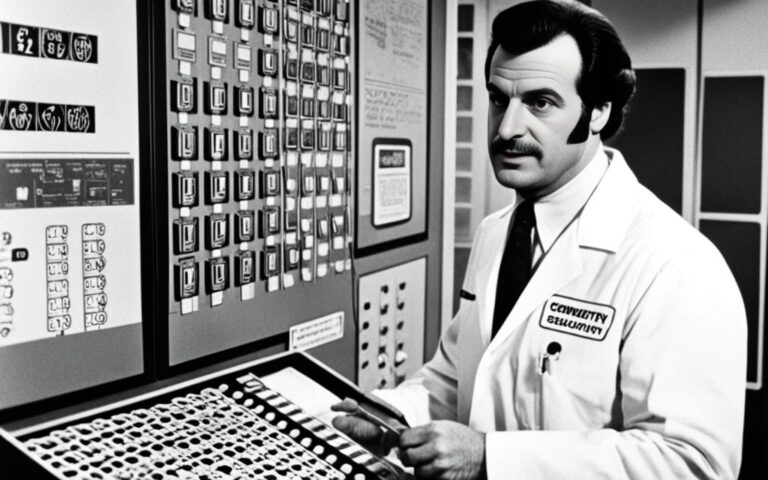Quantum computing is full of promise but faces many barriers to adoption. It’s vital to overcome these challenges for it to change industries fully.
Quantum decoherence1 is a big issue. Quantum systems don’t like noise and lose their information easily. Keeping them stable for a long time is hard.
Quantum error correction213 is another big challenge. Quantum computers make more mistakes than classical ones. We need strong ways to fix these errors for reliable results.
Scaling up quantum computing is tough13. Qubits are fragile and hard to keep working well with many of them. Making them work together is a big challenge.
Building quantum hardware is hard too3. There are many types of qubits, each with its own problems. Creating reliable and efficient quantum computers is hard.
Quantum software is still new3. As quantum computing grows, we need better programming tools. These tools should make the most of quantum algorithms.
Getting data between classical and quantum computers smoothly is key3. We need ways to communicate securely and easily between them.
Setting standards for hardware, software, and communication is important3. These standards will help everyone work together better and build a strong quantum world.
Key Takeaways:
- Quantum decoherence is a big challenge1.
- Fixing errors in quantum computing is crucial213.
- Scaling up qubits is hard13.
- Creating quantum hardware is complex3.
- Quantum software is still developing3.
Challenge 1: Quantum Decoherence
Quantum decoherence is a big problem in quantum computing. It happens when a quantum system interacts with its environment. This interaction causes the loss of quantum behavior and reduces the coherence time4. Coherence time is how long quantum information can be kept without getting mixed up by outside factors. Losing this coherence can cause errors in calculations and slow down quantum computing.
Quantum decoherence is linked to many hardware and software issues, making it hard to use quantum computing widely. Noise and decoherence are big problems at the hardware level, making it tough to keep quantum states stable for calculations4. To overcome this, scientists are looking for new materials and designs that can keep qubits coherent for longer.
Another big challenge is the need for huge classical resources to simulate quantum computers accurately4. As quantum computers get bigger, solving them becomes much harder. This means we need a lot of computing power to simulate quantum systems well. Finding ways to deal with this could make quantum computing useful for more things.
Quantum decoherence also affects how algorithms and tasks work in quantum computing4. Measuring entanglement-based qubits and isolating quantum computers are tricky. They need careful control to stop decoherence and errors. So, improving these areas is key to making the most of quantum computing.
Finally, quantum computing can handle huge amounts of data at once, which is a challenge4. Quantum computers could change how we analyze data. But, we need more research and better technology to fully use this power.
In summary, quantum decoherence limits how well quantum computing works. To overcome this, we need to improve qubit coherence, solve hardware and software problems, and advance algorithms and tasks. This will help unlock quantum computing’s full potential in different areas.
Challenge 2: Quantum Error Correction
Quantum error correction is key for quantum computing. Quantum systems often make mistakes, so we must detect and fix these errors to ensure reliable calculations.
But, correcting errors in quantum systems is harder than in classical ones. Qubits are very sensitive to noise, which causes errors. To fix these, we need more qubits, making things harder5.
Scientists are working on better error correction codes, like topological codes. These codes help spot and fix errors in qubits. This makes quantum calculations more accurate and robust5.
Fixing errors is vital for big, reliable quantum computers. It helps solve the problems of detecting and correcting errors. This ensures quantum computers work well and accurately5.
With quantum error correction, we can make advanced algorithms and applications. Researchers are looking into where quantum computers beat classical ones. They’re also tweaking old algorithms for quantum use5.
Also, quantum computers bring up ethical and security worries. They could change how we encrypt data, threatening current security methods. So, we’re getting ready for quantum-proof encryption to keep our data safe5.
Challenge 3: Scalability
Scaling up quantum computers is harder than just adding more qubits. As more qubits are added, keeping them in sync and reducing mistakes gets tougher. Quantum computers need all qubits to work together, which gets harder with more qubits. New tech and qubit designs are being looked into to make scaling easier and errors fewer.
Scaling quantum computing is a big challenge, especially making large systems with hundreds or thousands of qubits. The need for error correction grows fast with the number of qubits, making it hard6. For example, a 100-qubit system might need thousands more for error correction6. As more qubits are added, errors and decoherence become big problems for practical use6. These issues come from qubits being very sensitive to noise and interference7. Also, keeping qubits in a quantum state is key to making large-scale quantum computing work6. Longer coherence times for qubits are needed to make quantum computing more reliable7.
| Challenges | Statistics |
|---|---|
| High error rates and decoherence issues | Major obstacles facing practical implementation6 |
| Overhead required for error correction | Scales exponentially with qubit count6 |
| Scalability difficulties | Building large-scale quantum systems with hundreds or thousands of qubits6 |
| Delicate nature of qubits | Highly sensitive to quantum noise and interference7 |
| Quantum coherence | Significant barrier to scalability6 |
| Extending coherence times | Enhancing reliability of quantum computing hardware7 |
Creating scalable and fault-tolerant quantum computers needs precise engineering and making them8. Researchers are looking into new ways to make qubits better, like improving coherence and stability6. Making reliable quantum connections is key for scaling up quantum computing6. Also, stopping quantum state leakage is crucial for reliable quantum computing7. This leakage can affect the accuracy and security of quantum computing and communication7. Making better quantum gates is important for controlling qubits in quantum circuits7. Limited connections in quantum systems also limit how complex and big quantum circuits can be7.
Qubit Technologies and Evaluation
Qubit technologies are key in quantum computing. They help decide how well and effectively quantum systems work. Many qubit technologies are being looked into, each with its own strengths and weaknesses. This makes it vital to check these technologies out for making strong quantum computing systems.
Photonic networks are one type of qubit technology. They use photons as qubits. Photons can travel far without losing their quantum state, making them good for quantum communication. But, making and measuring photons well is hard for doing quantum tasks.
Superconducting circuits are another type of qubit tech. They use superconducting materials to make qubits and do quantum tasks. These qubits are getting better at handling more qubits and making fewer mistakes9. Yet, keeping these qubits stable is tough because they can be affected by noise and temperature changes.
Spin qubits, based on electron or nuclear spins, are getting more attention. They last a long time and work well with current tech. But, controlling and checking spin qubits is hard, which limits how many you can use9.
Neutral atoms in optical traps are also being looked at for qubits. These atoms can be controlled and checked well, offering long-lasting quantum states. But, working with individual atoms and linking qubits together is a big challenge9.
Trapped ions are another leading qubit tech. They have shown to work well and last long, making them a strong choice for quantum computing. But, adding more ions and keeping them working together is hard9.
When looking at qubit technologies, we must think about things like how long they last, how accurate they are, how big they can get, and how they fit with current tech. Also, how much they cost and how easy they are to get can affect their use. Quantum computing needs special chips, which are about $10,000 each, unlike regular chips which are under $20010.
In conclusion, checking out qubit technologies is key for making efficient and big quantum computing systems. Each type of qubit has its own good points and challenges. Knowing these is crucial for using quantum computing to its fullest. As we keep improving qubit technologies, we’ll see big steps forward in quantum computing11.
Cost and Accessibility
Quantum computing has huge potential for solving complex problems and changing many industries. But, its high cost is a big hurdle to its use by more people12. Making and keeping quantum computers costs a lot, making them hard for many groups to afford1213. They need special places to work, with cool systems to keep the tiny parts working right13. This makes quantum computing expensive13.
To make quantum computing cheaper, experts and leaders are finding ways to make it more affordable. They’re working on better hardware, fixing mistakes, and controlling the computers better12. This could make it cheaper to build and run quantum computers, helping more people use them12.
Data centers are key to getting quantum computing from labs to businesses13. They offer safe and growing places for companies to use quantum computing without the big costs of making their own13. But, moving quantum computing to data centers needs special setups for power, cooling, and keeping things still to stop mistakes13. These things add to the cost and make it harder for businesses to use quantum computing.
To help speed up the use of quantum computing, there are investment chances and money sources out there. FasterCapital, for example, helps fund building Minimum Viable Products (MVPs)14. They pay for 50% of the costs in exchange for a share of the company14. They also offer a free business package worth $35,000, which can help businesses pay less for quantum computing solutions14. FasterCapital links big projects with the money they need, helping industries like real estate, building, and film, which often have a lot of money to spend and face big challenges with quantum computing14.
In conclusion, quantum computing is very promising but its high cost is a big obstacle to its use by more people. To overcome this, we need better hardware, ways to fix mistakes, and support from groups like FasterCapital121314. By making it cheaper and easier to get to, quantum computing can change many industries, bring new ideas, and solve hard problems.
Workforce and Experience
Building a skilled team is key for quantum computing to move forward. Yet, there’s a big shortage of quantum computing talent with the required expertise in quantum computing. This shortage is a big hurdle for the industry’s growth and use15.
Quantum computing blends knowledge from quantum mechanics, computer science, and engineering. These experts are vital for pushing the field ahead and solving tech challenges. To tackle the talent shortage, many groups and efforts are focusing on training a skilled team and encouraging teamwork across disciplines16.
IBM’s Quantum Educators program drew in 4,000 students from over 100 countries, way more than the 200 expected. This program teaches students the skills they need for quantum computing. The IBM Quantum Global Summer School also trains the next wave of quantum developers, with 4,000 students showing strong interest16.
The UK’s National Quantum Strategy plans to train 1,000 new PhD students in quantum science and engineering by 2033. The National Quantum Computing Centre (NQCC) runs summer schools and placements to give students early hands-on experience in quantum fields17. The NQCC also offers short courses with the University of Bristol, drawing in people from different fields17.
It’s crucial to keep talented people in the field. Encouraging women and people from diverse backgrounds in STEM subjects is key for a diverse quantum computing team. Roundtable discussions highlighted the importance of balancing hopes with the real potential of quantum computing to keep talented people on board16. Groups like the NQCC aim to build a sustainable, diverse team, helping future careers in quantum computing17.
Quantum Computing Workforce Development Initiatives
| Initiative | Description |
|---|---|
| IBM Quantum Educators program | Aimed at equipping students with the skills and knowledge for quantum computing development and applications |
| IBM Quantum Global Summer School | Provides training to the next generation of quantum developers with high enrollment demonstrating interest in the field |
| UK’s National Quantum Strategy | Aims to train 1,000 new PhD students across all areas of quantum science and engineering |
| NQCC Programs | Includes summer schools, undergraduate placements, and intensive short courses in collaboration with the University of Bristol, engaging with industry professionals and researchers |
These efforts, along with private funding and partnerships, are key to growing a skilled team for quantum computing. As the industry grows, private funding for quantum computing has soared, with over $1.7 billion invested in start-ups in 2021, more than double the year before15. With a potential value of nearly $80 billion, the need for quantum computing talent is set to grow. This creates a great chance for those with the right skills to make a big impact15.
Quantum computing is set to change many industries, like automotive, chemicals, and pharmaceuticals, each worth billions annually. The need for a skilled team to use quantum computing’s potential is clear15.
By focusing on developing the workforce, promoting teamwork, and creating inclusive spaces, the quantum computing industry can overcome the talent shortage. Efforts like the Quantum Educators program, National Quantum Strategy, and NQCC programs are setting the stage for a future where diverse professionals drive innovation and applications1617. The excitement and development of skills across disciplines will push quantum computing forward, unlocking its full potential.
Quantum Computing and AI
The link between quantum computing and artificial intelligence (AI) is exciting for the future. Quantum computing’s power can change AI for the better. It can solve complex problems that are hard or impossible for current computers.
Quantum computing can boost AI in many ways. It can speed up and improve data analysis. This means AI can make better predictions and solve problems more efficiently.
Also, quantum computing lets AI tackle tasks that are too hard for regular computers. Quantum algorithms can speed up learning and make AI more accurate.
Quantum computing does more than just make AI faster. It can lead to new solutions for old problems. For example, it could make AI security systems better, fighting off cyber threats18.
But, combining quantum computing and AI isn’t without its challenges. Quantum computers are still in labs because they’re expensive and hard to use13. Making them work in businesses is also tough13. Companies like Microsoft are working hard to make quantum computing easier to use19.
In summary, quantum computing and AI together could change AI’s limits. They could make data analysis, predictions, and optimization much better. As quantum computing gets better, we’ll see big changes in AI across many industries. This will open up new ways to solve complex problems and bring in a new era of smart technologies.
Future of Quantum Computing
The future of quantum computing looks bright, with the market set to grow a lot in the next few years. Improvements in qubit technology, error correction, and making bigger and more reliable quantum computers are key to this growth.
Countries like the U.S., China, and those in the European Union are leading in quantum research20. They’re putting a lot of money into making quantum computing better and more useful.
Big tech companies like IBM, Google, Intel, and Microsoft20 are leading the charge in quantum computing. Their work is pushing the limits of what we can do with quantum computers.
Universities around the world are starting quantum computing courses20. This includes programs for students and high schoolers, aiming to create a skilled workforce in this area. For example, Qubit by Qubit offers courses for high school students20.
IBM’s Qiskit lets people learn about quantum computing by themselves20. It gives users a chance to try out quantum computing and learn by doing.
Companies like IBM and Amazon offer quantum cloud services20. This lets researchers and developers use quantum computers without needing a lot of equipment.
Money from governments and organizations can help make quantum computing cheaper20. This will help more people and companies use it, leading to more innovation.
Working together, the public, private, and academic sectors can speed up the use of quantum computing20. Their combined efforts will lead to new discoveries and improvements in this field.
It’s important to have rules for using quantum computing safely and ethically20. As these computers get better, we need to make sure they’re used right and keep people’s data safe.
We need to make quantum computing more affordable and open to everyone20. This will encourage more people and businesses to use it, leading to new discoveries and changes in many areas.
| Key Statistics | Reference |
|---|---|
| IBM, in 2016, was the first company to offer quantum computing systems through the IBM Q Network, now with over 125 organizations in collaboration | 21 |
| By the year 2023, IBM aims to develop a quantum computer featuring a 1,121-qubit processor, housed in a 10-foot tall “super-fridge,” capable of delivering Quantum Advantage | 21 |
| Atom Computing specializes in neutral atom quantum computers, offering cloud access to large numbers of coherent qubits | 21 |
| Xanadu Quantum Cloud (XQC) service provides users with access to near-term quantum devices using silicon photonic hardware | 21 |
| ColdQuanta commercializes quantum atomics, including quantum computing solutions and systems for various applications | 21 |
With ongoing progress and investment, quantum computing has a bright future. It will likely change many industries, solve complex problems, and open up new areas in science, medicine, finance, and more.
Conclusion
Quantum computing faces challenges but has a bright future. It’s set to reach USD $125 billion by 2030, growing at 36.98% annually22. It’s key in improving supply chains, finding new medicines, and tackling climate change22.
Over 40 years, leaders like IBM and Google have pushed quantum computing forward23. Finance and healthcare are now using it for complex tasks23. It’s also merging with AI to change how we analyze data and predict outcomes23.
Quantum computing tackles tough problems like stability and error correction23. The complexity of these systems is a big hurdle, but research is ongoing24. It also offers top-notch security, making data safer23.
Despite hurdles, quantum computing is set to change industries by solving complex problems faster22. With ongoing progress, it will soon outperform traditional computers in many areas22. Quantum computing is key to unlocking new possibilities and changing the world.
FAQ
What are the challenges hindering quantum computing adoption?
Challenges include quantum decoherence, error correction, scalability, cost, and a lack of skilled workers.
What is quantum decoherence?
Quantum decoherence happens when a quantum system interacts with its environment. This interaction causes it to lose its quantum behavior. It leads to errors in computing.
Why is quantum error correction important?
Quantum error correction is crucial for quantum computing. It helps detect and fix errors in quantum systems.
How does scalability pose a challenge in quantum computing?
Scaling up quantum computing is hard because of the need to keep qubits in sync and error-free. As more qubits are added, this gets harder.
What are the different qubit technologies being researched for quantum computing?
Researchers are looking into various qubit technologies. These include photonic networks, superconducting circuits, spin qubits, neutral atoms, and trapped ions.
Why is the cost of quantum computing a barrier to adoption?
Quantum computers are pricey and need special conditions to work. This makes them hard for many to use. Making them cheaper is a focus area.
What is the workforce challenge in quantum computing?
There aren’t enough experts in quantum mechanics, computer science, and engineering. This shortage slows down the development and use of quantum computing.
What is the potential synergy between quantum computing and artificial intelligence (AI)?
Combining quantum computing with AI could boost AI’s abilities. This could lead to big improvements in data analysis, predictions, and optimization.
What does the future hold for quantum computing?
Quantum computing’s future looks bright, with ongoing improvements in qubits, error correction, and making it more accessible. The market for it is expected to grow a lot in the next few years.
Source Links
- https://bloghart.com/what-is-a-barrier-to-entry-preventing-quantum-computing/ – What Is a Barrier to Entry Preventing Quantum Computing? – Bloghart.com
- https://atelier.net/insights/quantum-conundrum-challenges-quantum-computing/ – The quantum conundrum: Challenges to getting quantum computing on deck
- https://thequantuminsider.com/2023/03/24/quantum-computing-challenges/ – What Are The Remaining Challenges of Quantum Computing?
- https://typeset.io/questions/why-is-quantum-computing-is-so-difficult-to-achieve-40lkgfl9ay – Why is quantum computing is so difficult to achieve? | 5 Answers from Research papers
- https://medium.com/@shakeelurrahman225/hype-about-quantum-computers-heres-what-might-shatter-your-excitement-3b7a0b3d2239 – Hype About Quantum Computers- Here’s What Might Shatter Your Excitement
- https://ms.codes/blogs/computer-hardware/what-is-a-barrier-to-entry-preventing-quantum-computing-hardware – What Is A Barrier To Entry Preventing Quantum Computing Hardware
- https://softwareg.com.au/blogs/computer-hardware/what-is-a-barrier-to-entry-preventing-quantum-computing-hardware – What Is A Barrier To Entry Preventing Quantum Computing Hardware
- https://ms.codes/blogs/computer-hardware/barrier-to-entry-preventing-quantum-computing-hardware – Barrier To Entry Preventing Quantum Computing Hardware
- https://www.wired.com/story/wired-guide-to-quantum-computing/ – The WIRED Guide to Quantum Computing
- https://www.csis.org/analysis/quantum-technology-applications-and-implications – Quantum Technology: Applications and Implications
- https://jackkrupansky.medium.com/the-greatest-challenges-for-quantum-computing-are-hardware-and-algorithms-c61061fa1210 – The Greatest Challenges for Quantum Computing Are Hardware and Algorithms
- https://softwareg.com.au/blogs/computer-hardware/barrier-to-entry-preventing-quantum-computing-hardware – Barrier To Entry Preventing Quantum Computing Hardware
- https://www.techradar.com/pro/removing-the-biggest-barrier-to-quantum-adoption-accessibility – Removing the biggest barrier to quantum adoption: accessibility
- https://fastercapital.com/topics/challenges-and-limitations-in-implementing-quantum-algorithms.html/1 – Challenges And Limitations In Implementing Quantum Algorithms – FasterCapital
- https://www.mckinsey.com/capabilities/mckinsey-digital/our-insights/quantum-computing-use-cases-are-getting-real-what-you-need-to-know – Quantum computing use cases are getting real—what you need to know
- https://newsroom.ibm.com/quantum-workforce-roundtable – IBM Roundtable: Building a Quantum Workforce Requires Interdisciplinary Education and the Promise of Real Jobs
- https://physicsworld.com/a/skills-development-provides-pathways-into-quantum-workforce/ – Skills development provides pathways into quantum workforce – Physics World
- https://www.linkedin.com/pulse/future-challenges-ai-quantum-computing-cybersecurity – The future challenges for AI: quantum computing, cybersecurity and deepfakes
- https://quantumzeitgeist.com/microsoft-quantum-computing/ – Microsoft Quantum Computing. A Quantum Journey With The Pioneers Behind Windows, DOS, Azure, And XBox.
- https://www.forbes.com/sites/forbestechcouncil/2023/06/20/bridging-the-quantum-divide/ – Council Post: Bridging The Quantum Divide
- https://hackernoon.com/understanding-the-power-of-quantum-computing – Understanding the Power of Quantum Computing | HackerNoon
- https://www.insurancethoughtleadership.com/our-partners/quantum-technologies-cybersecurity-and-change-ahead – Quantum Technologies, Cybersecurity and the Change Ahead
- https://bloghart.com/why-might-businesses-be-interested-in-using-quantum-computers/ – Why Might Businesses Be Interested in Using Quantum Computers – Bloghart.com
- https://www.researchgate.net/publication/381263452_A_survey_analysis_of_quantum_computing_adoption_and_the_paradigm_of_privacy_engineering – (PDF) A survey analysis of quantum computing adoption and the paradigm of privacy engineering


















